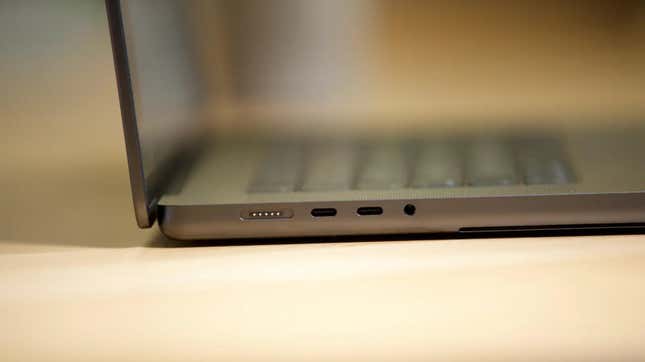ARTICLE AD
Apple released 14 and 16-inch variants of the MacBook Pros touting its newly-released M3 chips. It doesn’t bring a lot of new upgrades and doesn’t make much sense if you’re on an M2-series chip already. However, if you’re one of those Intel or M1 MacBook Pro holdouts, now might be the time for a change.
Probably one of the most exciting things about this release (at least for me) is the new Space Black color variant. After years of getting just Space Grey and Silver, we really needed this. Sadly, that’s only for the 14-inch version with the Pro and Max chips, so I didn’t get to experience that, and my heart is broken.
The configuration I was sent hosted the M3 chip, along with 16GB of memory and 1TB of storage (in gray) for $1,999, which feels like the sweet spot since the $1,599 model with 8GB and a 512GB SSD seems a little underpowered especially if you plan on taking advantage of the M3 chips gaming performance.
The M3 Max MacBook Pro is the Same Beast You Know and Love | Gizmodo Review
M3 MacBook Pro Build and Ports
You get a cooler build if you opt for the Pro or Max chips
Another thing I missed out on because of being sent the machine with the M3 chip was an additional Thunderbolt port. I only have two Thunderbolt ports, as opposed to the 14-inch models with M3 Pro and M3 Max, both of which host three Thunderbolt ports. My machine also features a 3.5mm headphone jack, a MagSafe 3 port, an HDMI port, and an SDXC card slot.
Like the 2021 M1 MacBook Pro and the 2023 M2 model, Apple has decided not to include a USB-A port, which is a serious omission when you insist that your machine is ideal as a gaming rig. Sure, you can connect a USB-C hub to get your other peripherals to connect, but that’s extra effort.

Image: Angel Fajardo / Gizmodo
I get the idea behind giving M3 users one less Thunderbolt port than M3 Pro and M3 Max folks. It didn’t give me any FOMO either; the two available ports met all my USB-4 needs.
Looking at how modern laptops have started featuring very few ports (especially omitting the HDMI out) to keep their form factor as slim as possible, I was pretty content with the generosity of the M3 MacBook Pro’s port layout.
M3 MacBook Pro Design
There’s nothing new here since the M2 release.
You get the same Liquid Retina XDR display that you did on this laptop’s older models. It hits a 120Hz refresh rate and 1000 nits in brightness. Some consumers (like me) have been patiently waiting for Apple to do OLED displays, but here we are. If you’re content with the Retina display, you will enjoy your content as much as you always have. But that gives you one less reason to upgrade to this series.
Similarly, expect the same keyboard as the ones that you have been getting for a few years, including the full-sized Function keys and the touch ID button. The keyboard doesn’t bring any new surprises, so you can look forward to the good ol’ nice and clicky MacBook typing experience that we’re all fans of. The touchpad is as responsive and smooth as before, with flawless multi-touch handling capability that never stutters.

Image: Angel Fajardo / Gizmodo
M3 MacBook Pro Performance
As smooth as ever.
The 14-inch variant with the M3 chip features an 8-core CPU, 10-core GPU, and a 16-core Neural Engine. That’s intended to (and is enough for) handle your everyday computing needs. I spent last week with this machine and used it for everything during those days. I think it’s redundant to say that my workflow was as smooth as ever because what else does one expect from a MacBook Pro?
But again, I’d have pretty much the same experience even if I was on the M2 or even the M1 version. When Apple tempts us with performance upgrades, it fails to consider that those stats might not translate to an actual significant upgrade in terms of user experience for the average consumer. If you’re not gaming or doing creative work, the M3 MacBook Pro is an excellent day-to-day laptop.
As far as benchmarks, we see fairly modest gains, with the M3 MacBook Pro scoring a 3129 single-core Geekbench CPU score compared to 1965 on the M2 Pro MacBook Pro. Similarly, this MacBook’s 3311 Cinebench GPU score compared to 1260 on the M1 is a considerable bump, especially if you plan on doing some light video or photo editing.
If you’re into gaming, the M3 Macbook Pro does offer modest gaming performance, with games like Lies of P and Resident Evil Village running reasonably smoothly in medium settings. As lovely as that is, you’re limited in what kind of games you can play since a lot of AAA gaming titles aren’t available on the Mac.
M3 MacBook Pro Battery, Speakers and Camera
The speakers and battery are considerably better, and the camera is the same as before.
The M3 MacBook Pro features the same six-speaker sound system that its M2 predecessor did. You get two tweeters for a clear soundstage and four force-canceling woofers. And if you’re consuming content that supports Dolby Atmos, you’ll also be able to enjoy spatial audio. I YouTubed for hours on this machine, watching everything from vlogs, sports, TED talks, and songs.
I was left quite impressed with the punchy bass and wide soundstage. I wasn’t expecting that oomph in the bass that I would typically expect from a dedicated speaker. Whether it was a song or narration, everything had depth to it. Dialogue on the M2 MacBook Pro sounded a bit ‘tinny,’ but Apple took that complaint to heart. Even the dialogue on this machine had layers and featured excellent sound imaging.
You get the same 1080p camera as you did in the M2 and M1 versions, and it’s pretty good. The colors are rich, sufficiently saturated, and vibrant. The results aren’t as washed out as they usually are on laptop webcams. The lens is precise enough to capture the texture of your skin exactly.

Image: Angel Fajardo / Gizmodo
Also, despite much backlash on multiple online forums, Apple decided to keep the notch that it introduced in 2021 on the 2023 M3 MacBook Pro. Consumers have long been complaining about how it takes away from the sleek design or how the laptop looks like an enlarged iPhone. It isn’t a deal breaker anyway, and if you’re bothered by it, having dark wallpaper helps.
Macs being incredible in terms of battery life is nothing new. We all know that Windows laptops don’t even come close. The company promised a whopping 22 hours on the machine and didn’t exaggerate. I noticed an approximate 10% drop every two hours throughout my usage. The drop would slightly differ based on the kind of activity I was engaged in. That amounts to just around 20+ hours of use. This is a pretty good upgrade, considering the M2 Pro MacBook Pro lasted 16 hours and 40 minutes.
Should You Buy the M3 MacBook Pro?
Make the move if you’re on an M1 or Intel series chip.
Apple’s promises of the M3 series being 20-30% faster than the M2 and 50% faster than the M1. If you are dealing with heavy workloads (in which case, you should probably be looking at the 16-inch variant with the Max chip instead), this bump in performance will not be life-changing for you. Unless you’re upgrading from an older Intel-powered MacBook Pro or if you’re M1 MacbookPro is starting to show its age.
Most features are exactly the same as the M2 MacBooks that were released earlier in the year. Sure, the battery lasts a couple of hours longer, and the benchmark results are slightly better, but nothing is worth a whole upgrade, especially if you’re coming from the M2-powered MacBook Pro.
Want more of Gizmodo’s consumer electronics picks? Check out our guides to the best laptops, best TVs, and best headphones. If you want to learn about the next big thing, see our guide to everything we know about the iPhone 16.

 8 months ago
41
8 months ago
41 

